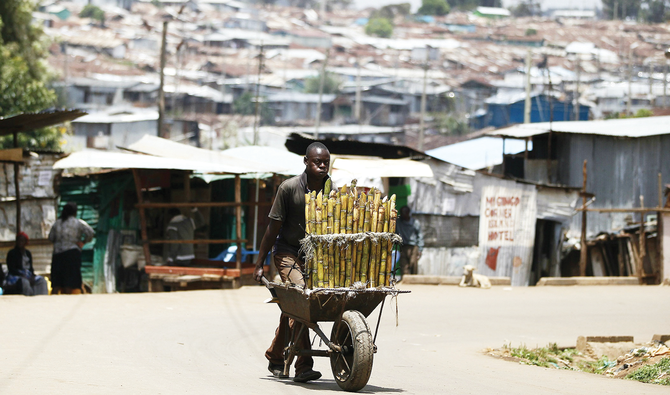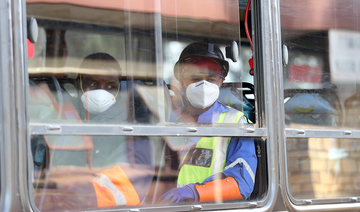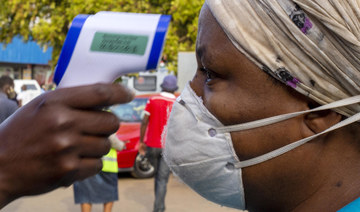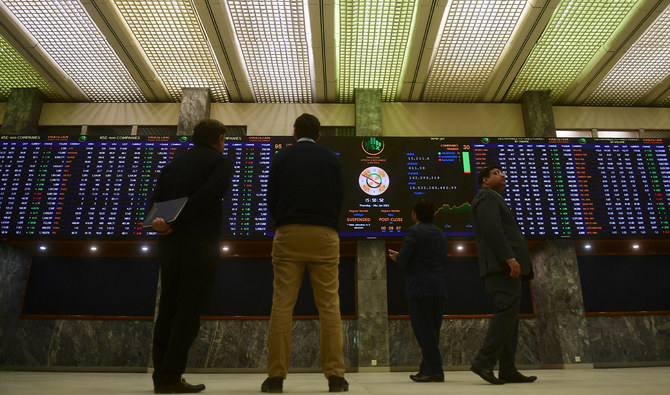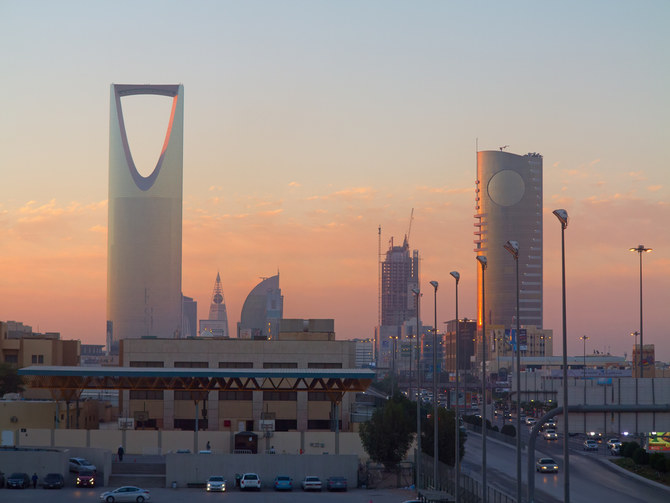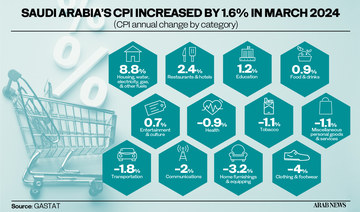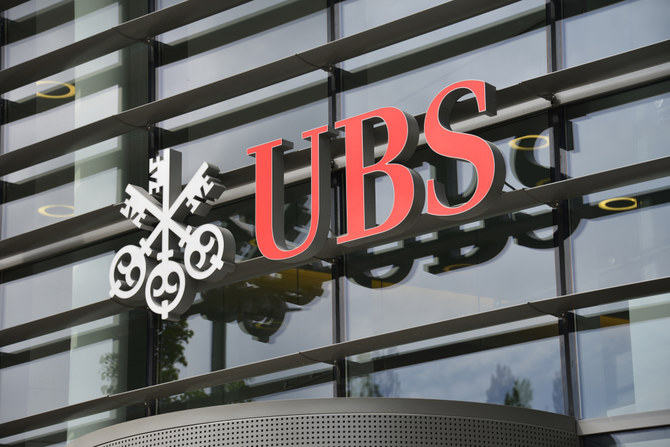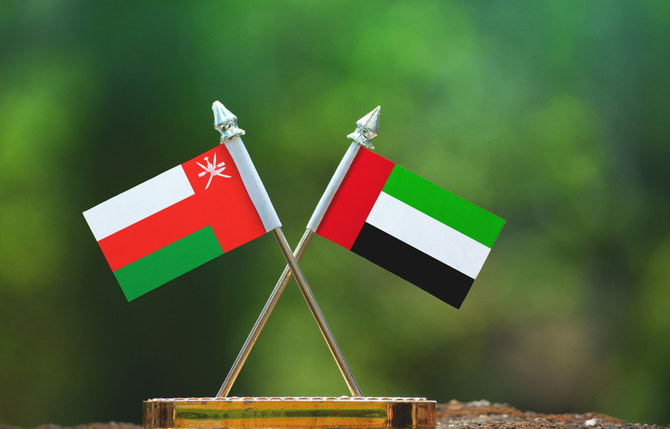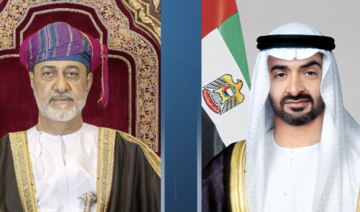ADDIS ABABA: As a domestic worker, Amsale Hailemariam knew well the luxury villas that had grown up around her simple shelter of raw metal and plastic sheeting. In them, she saw how her country, Ethiopia, had transformed.
“Oh God, a day will come when my life will be changed, too,” she thought. The key lay in her daughter, months from a career in public health. Then a virus mentioned in none of her textbooks arrived, and dreams began to fade.
Decades of progress in one of modern history’s greatest achievements, the fight against extreme poverty, are in danger of slipping away because of the COVID-19 pandemic. The world could see its first increase in extreme poverty in 22 years after whittling it down to 10 percent of the population, further sharpening inequalities.
“We are living in a state where we are above the dead and below the living,” Amsale said, near tears. “This is not life.”
Up to 100 million more people globally could fall into the bitter existence of living on just $1.90 a day, according to the World Bank. That’s “well below any reasonable conception of a life with dignity,” the United Nations special rapporteur on extreme poverty wrote this year. It comes on top of the 736 million people already there, half in just five countries: Ethiopia, India, Nigeria, Congo and Bangladesh.
Even China, Indonesia and South Africa are expected to have more than 1 million people each fall into extreme poverty, the World Bank says.
“It’s a huge, huge setback for the entire world,” said former US Agency for International Development administrator Gayle Smith, now president of the ONE Campaign. She called the international response to the overall crisis “stunningly meager.”
Most of those newly at risk are in sub-Saharan Africa, which had some of the world’s fastest growing economies in recent years. The World Bank shared with the AP the earliest data out of Ethiopia as it takes a global measure of the pandemic’s effects. Similar efforts are underway in more than 100 countries.
Ethiopia had boasted of one of the world’s most dynamic economies. Its transformation began in 1991, when the country was exhausted by war. A new leader, Meles Zenawi, was shaking off years of Marxist dictatorship and terrifying drought whose images of withered children left the world aghast. His legacy would be the emergence of millions from grinding poverty.
Amsale and her newborn daughter, Bethlehem Jafar, were newly arrived in the capital, Addis Ababa. Amsale scraped by through manual labor, vowing her girl would never do the same.
Ethiopia’s government looked to emulate China’s astonishing lifting of more than 800 million people from poverty. Some people embraced new manufacturing jobs. Others joined the growing sectors of hospitality, services and aviation, hoping to join Africa’s expanding middle class.
Ethiopia’s number of people in extreme poverty dropped from nearly half the population in the mid-1990s to 23 percent two decades later. “Impressive,” the World Bank said.
Addis Ababa, already Africa’s diplomatic capital, became its aviation hub. Under the country’s Nobel Peace Prize-winning Prime Minister Abiy Ahmed, the city has seen a wave of new construction. And a source of national pride is a massive dam near completion on the Nile, a bid to pull millions more from poverty.
Now the country, along with Congo, Kenya, Nigeria, and South Africa, is expected to see half of sub-Saharan Africa’s new extreme poor.
Ethiopia’s prime minister has taken the global lead in appealing to rich countries to cancel the debt of poorer ones, saying his country spends twice as much on paying off external debt as it does on health.
Fitsum Dagmawi has heard his countrymen’s fear. He is calling fellow citizens for the World Bank survey and asking how their lives have changed.
Some ask him: What will we do now? “I will have to struggle,” one head of a household said.
The first round of calls to 3,200 households found a 61 percent drop in employment, with many job losses in sectors tied to growth: Construction, hospitality, restaurants, big hotels. The second round saw a partial rebound, but that doesn’t mean people resumed the same stable jobs.
“Small shocks in income can have devastating effects,” World Bank senior economist Christina Wieser said.
For some Ethiopians, destitution is near. Nineteen percent of households are already eating less.
A quarter reported running out of food in the last 30 days.
So much depends on how long the pandemic lasts. The African Development Bank once assumed that COVID-19 would subside by June, country director Abdul Kamara said. Now, he said, “decades of poverty reduction in Ethiopia could be lost.”
Some 2.5 million jobs are threatened, he said, roughly the same number of Ethiopians who enter the workforce every year.
For a young woman like Bethlehem, the future seems in shambles. She now shelters with her mother just steps away from an overflowing public toilet. The neighbors who once welcomed Amsale into their homes to cook and clean now turn her away, fearing the virus.
Mother and daughter make do with the equivalent of $34 a month for helping with projects like sweeping the streets. But Amsale doesn’t like to go out, fearing infection.
They believe life will only become more difficult. “I really hope some vaccines will be available soon,” Bethlehem said.



